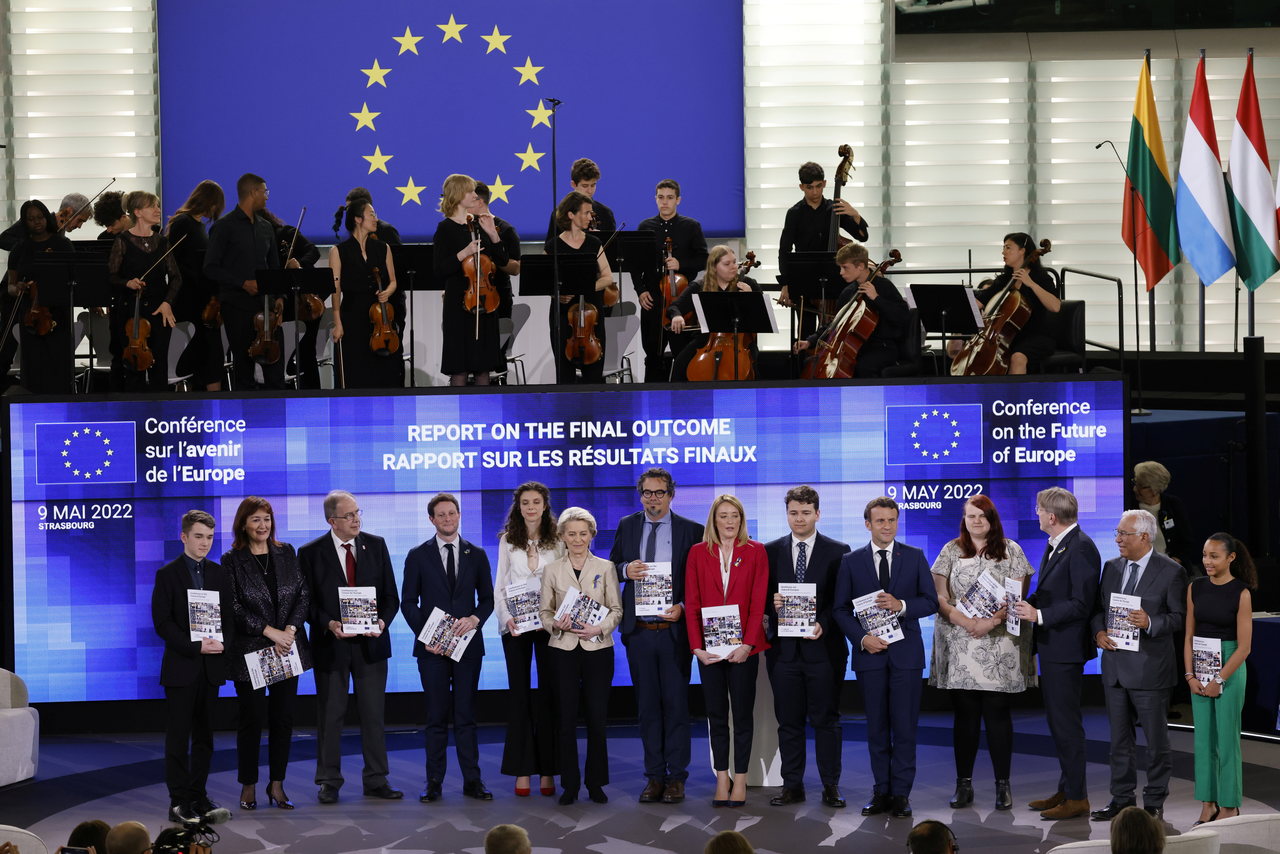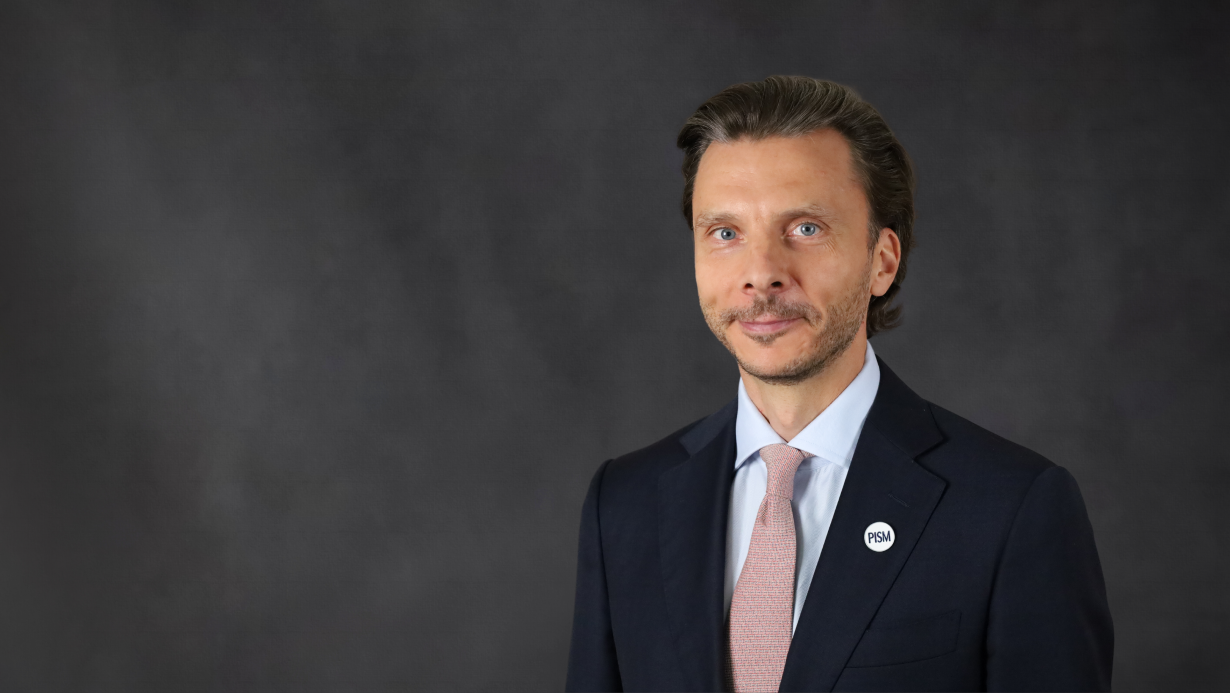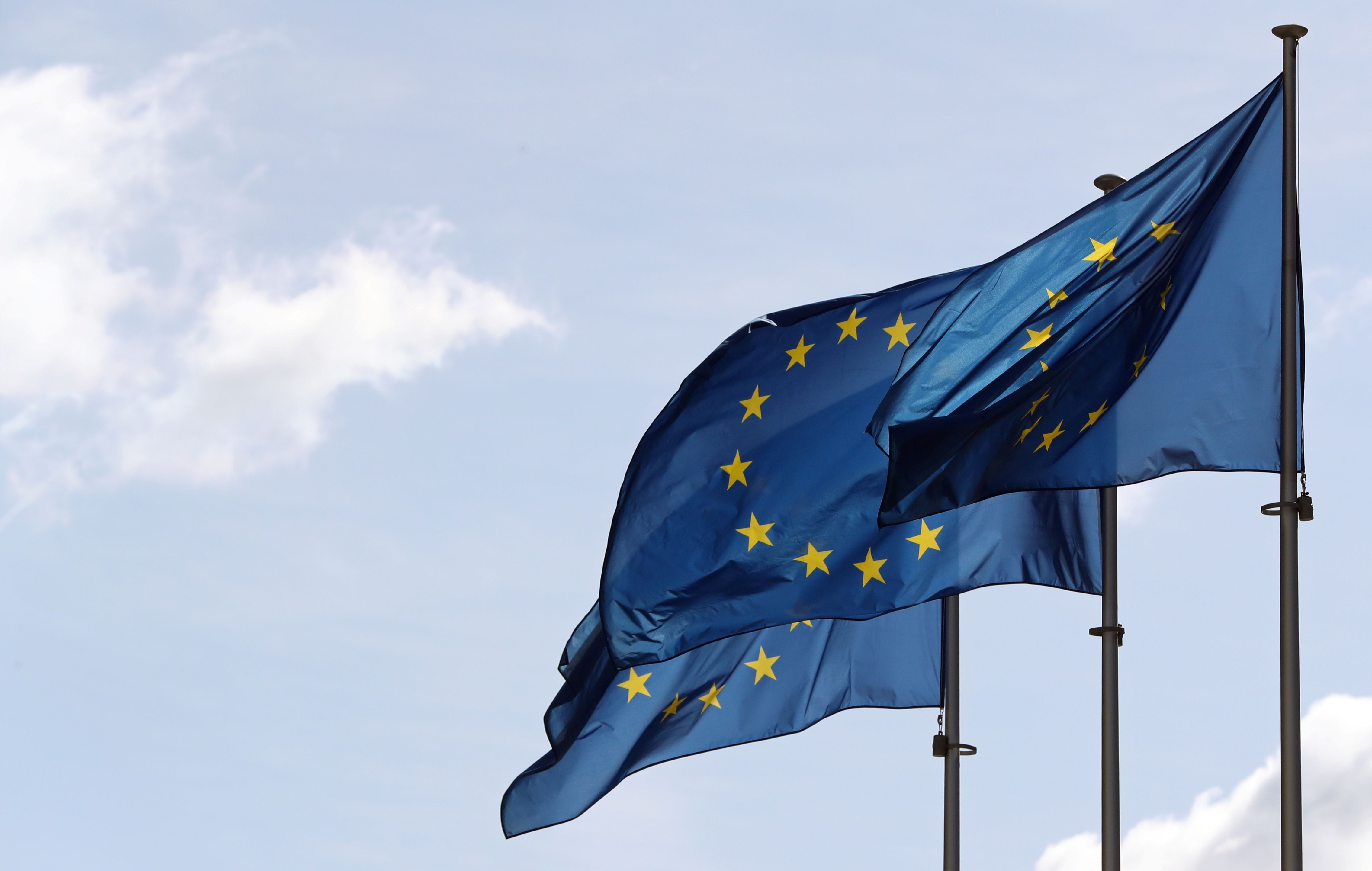Conference on the Future of Europe: Conclusions and Prospects for Implementation
Pleas made through the Conference on the Future of Europe (CoFoE) are in line with the European Commission’s (EC) vision of European Union development focused on the green transition and strengthening the Community’s economic potential and self-sufficiency. The conference proposals support closer integration, but the Member States and EU institutions differ in their views on the optimal ways for implementing citizens’ wishes. The European Parliament (EP) urges treaty change, while a dozen states from Northern, Central, and Eastern Europe do not consider it necessary.
 POOL/ Reuters/ FORUM
POOL/ Reuters/ FORUM
On 9 May, the ceremonial closing of CoFoE was held. The conference was built around Citizens’ Panels on which the participants were randomly selected as representative of EU society in terms of nationality, gender, and social profile (the only deviation was overrepresentation of people aged less than 25 to emphasise the future-oriented character of the conference). The final conclusions were spelled out by the plenary, a forum in which proposals worked out by the panels were discussed by citizens and politicians. This mode of proceeding was meant to increase the chances that the recommendations will be duly implemented.
Citizens’ Proposals
Four European Citizens’ Panels presented more than 150 recommendations (adoption required the support of 70% of the participants). The green transformation featured prominently among them, seen as a wide-ranging process of reducing the negative effects of economic and everyday activities on the environment and climate. Apart from advocating for the development of renewables—a standard plea in this context—the panels emphasised such objectives as the necessity to use raw materials more effectively, make products more durable, sanction companies that pollute, abolish single-use plastic packaging, and provide more comprehensive information on production processes to consumers. Participants also called for strengthening the social dimension of integration, urging the Member States to pay more attention to such issues as combatting poverty and promoting employment during the mutual assessment and planning phases of economic and fiscal policies. In several policy areas, such as healthcare, energy, and migration, citizens recommended closer coordination of national actions and strengthening community institutions. They also want a greater role in the decision-making process, for example, through regular consultations and—on fundamental issues—EU-wide referendums. The participants called for improvements in education, especially regarding the functioning of the EU and global challenges, and for more effective countermeasures against disinformation. The citizens’ propositions are compatible with the concept of European strategic autonomy as they stress modernisation of the industrial sector, diversification of supplies of key raw materials, and promotion of EU standards abroad. Moreover, citizens expect the EU to conduct more effective foreign policy. In this area, most of the participants stated that decisions should be made by a qualified majority, not unanimous consent.
At the stage of exchanges between citizens and decision-makers, the proposals adopted by the panels were not significantly modified. A couple of points were added, however. The EP delegation persuaded the other participants to embrace some institutional changes that would strengthen the chamber. CoFoE’s final report calls for granting the EP legislative initiative, boosting its role in naming the Commission president, through the spitzenkandidaten mechanism, and in adopting the multiannual EU budget. The majority of the EP delegation was united around a set of common objectives and could therefore influence the outcome of the conference more effectively than representatives of governments and national parliaments. Nonetheless, CoFoE participants also suggested that decision-makers consider allowing national legislatures to initiate EU legal acts .
Prospects for Implementation
The CoFoE proposals include a number of short-term goals related to ongoing negotiations and achievable in the current term of the Parliament and the Commission, so by spring 2024. These include harmonisation of rules regarding harmonisation of minimum wages, new sources of revenue for the Union, and reform of migration policy. Transformation of the economic system, supported by the citizens, will be a long-term process that depends on decisions made by the next Parliament and Commission. When it comes to common agricultural policy, for instance, citizens expect more far-reaching changes than those introduced by the latest reform agreed by the Member States this year. In certain areas, for example when it comes to common debt, CoFoE participants came up with rather general statements that do not indicate a future policy direction.
The EC president informed that in the next State of the Union address (this September), she would present several new initiatives to implement the citizens’ proposals. Moreover, she declared that the EC intends to consult citizens before publication of the most substantial proposals.
In the EP, five political groups—Christian and Social Democrats, Centrists, Greens, and the Left, which hold three-fourths of the seats—backed the CoFoE final report, while the Eurosceptics and Conservatives rejected it. The latter stressed that the conclusions did not make adequate mention of dissenting voices questioning the benefits of closer integration and strengthening supranational institutions. A few days after the adoption of the final report, the EP announced that it would put forward a proposal to change the treaties featuring the abovementioned institutional changes and a proposal to increase EU competences in such areas as health, external relations, and fiscal policy.
If the EP presents such a motion, the Member States will have to decide whether to establish a convention, a body composed of representatives of states and EU institutions whose task would be to assess the proposal. The French president and Italian prime minister already voiced their approval for such a move. The idea that a convention should follow CoFoE also appeared in the German coalition agreement adopted last autumn. However, more than a dozen Member States have expressed reservations about a treaty change. Bulgaria, Croatia, Czechia, Malta, Poland, Romania, Slovenia, as well as Baltic and Nordic states claimed in a common statement that attempts to trigger this process are premature. They also stressed that a majority of the citizens’ pleas could be implemented based on the Community’s current legal framework.
Conclusions and Prospects
The outcome of the CoFoE strengthens the arguments of advocates of closer integration as they will invoke the citizens’ opinions to legitimise their ideas. Yet, the pressure on institutional changes has also mobilised the opposing camp. The latter probably will agree to establish a convention, as refusal to discuss reforms could be seen as disregarding the will of the citizens, but there is little likelihood of reaching a compromise on treaty reform.
While treaty change is not indispensable, clashes that have occurred in recent years—with a prominent legal dimension—around issues such as the selection of the Commission president, common debt, and fiscal rules, show that settling these controversies would make the Community function more smoothly. The requirement of unanimity, even in just a few policy areas, has become increasingly problematic. The obligation to reach consensus is often abused by individual states as a lever to get concessions, usually on issues loosely related to the legal act in question and against the Community interest. Moreover, a stalemate on treaty change will encourage coalitions of the willing to proceed with closer integration in more restricted circles, which would provoke friction between EU members.
The CoFoE final report features a number of ideas that are close to Poland’s priorities. The citizens highlighted the importance of the single market and stressed the need to reduce gaps in living standards between the Member States. They also reiterated the principle of subsidiarity, which protects the EU against excessive centralisation. The idea to consider a greater role for national parliaments in EU politics is also in line with Poland’s position. While the Polish government is opposed to institutional changes promoted by the EP majority, without these changes—abolishing unanimity in particular—it will be difficult to persuade all members to accept further EU enlargements, which is important to Poland.





